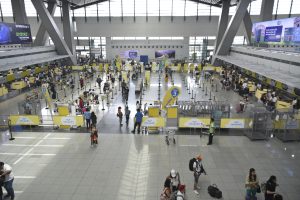The Philippine government suspended its revised travel guidelines for Filipinos going abroad after legislators, business groups, travel agencies, and migrants described the new requirements as “coercive, restrictive, and redundant.”
The Inter-Agency Council Against Trafficking (IACAT) released the draft in August as part of its intensified campaign against human trafficking. Aside from standard travel documents, some travelers could be required to submit notarized documents from those who sponsored their trips. Critics pointed out that it would entail additional costs for relatives abroad who need to notarize documents in Philippine consulates.
The Bureau of Immigration (BI) emphasized that the revised rules would streamline the process by identifying categories of travelers who may be required to undergo secondary inspection in airports. It also seeks to avoid complaints from passengers who may fail to board their flights on time because of their failure to present numerous documents under the current guidelines.
“The new guidelines issued by the IACAT would ensure that immigration officers look at specific requirements and not require frivolous documents which could later be a cause for complaints,” said BI Commissioner Norman Tansingco. He is referring to the viral video of a tourist who missed her flight because she was unable to show her college yearbook and graduation photo.
According to government data, 39,061 departing travelers were referred to a secondary inspection from January to May this year. Of this figure, 13,764 were prevented from leaving the country. Last year, 32,404 Filipinos were not allowed to proceed with their flights. Subsequent investigations revealed that only 472 were found to be victims of human trafficking or illegal recruitment.
The release of the IACAT guidelines instantly generated widespread opposition. Opposition Senator Risa Hontiveros warned that the “dysfunctional guidelines will only derail our nation’s anti-trafficking efforts.”
In a privilege speech, Senate President Juan Miguel Zubiri insisted that “there has to be a way to protect our people without also hampering their right to travel.” He added that first-time travelers could be subjected to “economic profiling”.
“Let us not victimize Filipino travelers with inefficiency. There are real perpetrators that we can target here, mainly illegal recruiters, and we must go after them, instead of burdening everyone else,” he said in his speech.
Former Solicitor General Florin Hilbay is worried that the guidelines can be used to “harass government critics.”
The former head of BI, Rep. Rufus Rodriguez, said that corrupt personnel could misuse the rules to victimize travelers. “Those are unreasonable rules,” he said. “They will give Filipino tourists, overseas Filipino workers and other travelers a lot of inconvenience, and they could make them vulnerable to harassment and extortion by corrupt immigration officers and other airport personnel.”
The Department of Justice (DOJ), which is part of IACAT, acknowledged the public uproar which it blamed on miscommunication. “We will say sorry because communication regarding the revised guidelines was not done well,” its spokesperson said. The agency also clarified that the revised guidelines did not add new requirements since they merely reiterated the specific travel documents as contained in the rules approved in 2005.
But this clarification didn’t stop the Senate from conducting an investigation which prompted the IACAT to suspend the implementation of the revised guidelines. The DOJ intends to clear the issues raised by various stakeholders as it remained firm in its stand that the rules uphold the citizens’ right to travel. “We assure the public that the revised guidelines aim to strike a balance between national security and the facilitation of smooth and efficient travel,” the DOJ said in a statement.
Labor group Migrante reminded authorities to focus on the more essential aspects of the anti-trafficking campaign. “The government should go after human traffickers, and not their victims. It can only counter human trafficking effectively if it starts creating decent jobs at home – and stop its intensification of the country’s labor export program,” the group said in a statement.
































